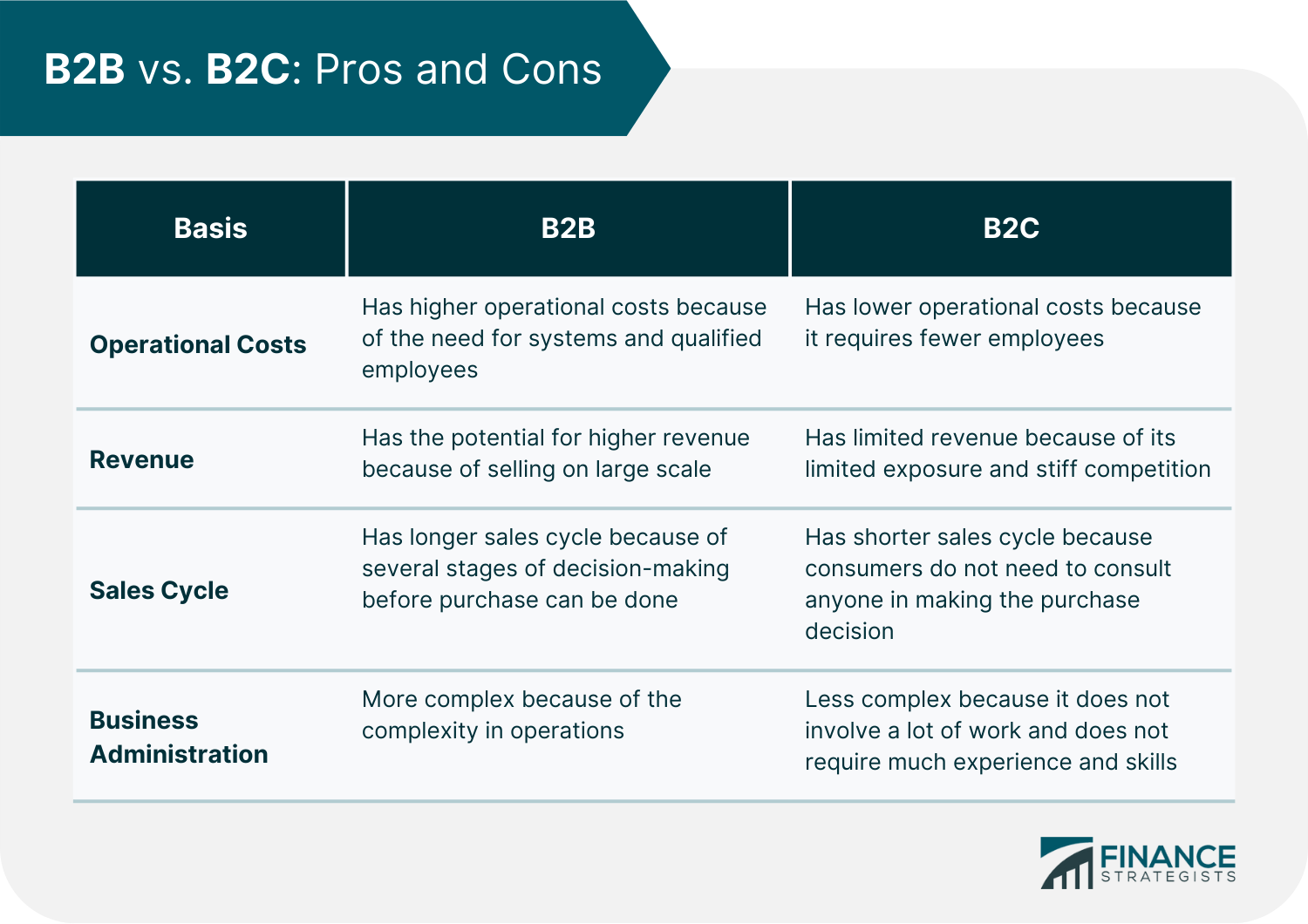Business-to-Business (B2B) and Business-to-Consumer (B2C) are two different types of business models. These two terms describe a typical business relationship.
B2C is a business model in which a company sells a service or product directly to a consumer.
It is the alternative to the B2B model in which a company sells its products first to another business, who then sells the product at a retail store at a marked-up price.
In a B2B model, an entire organization could be involved in finalizing the purchase.
It can involve other departments such as, but is not limited to, a board of trustees, C-level executives, and finance. In the case of a B2C model, the customer is the sole decision maker.
What Is B2B?
B2B is a type of business transaction between two businesses. It targets other companies and involves selling products or services that will be used in the business operations of another company.
It can also target other organizations, such as government agencies and non-profit organizations. A B2B can occur between a manufacturer and wholesaler, wholesaler and retailer, or two companies that use the services or products of each other.
The B2B market encompasses everything from industrial suppliers to payroll processors to software developers.
For example, the automobile industry. A truck or car that ends up in a consumer's driveway contains dozens of parts and products that were purchased through different suppliers in a B2B transaction.
Typically, B2B transactions occur under three conditions:
- When a business is sourcing materials, like office supplies or automobile parts
- When a business is sourcing services, such as hiring an accounting firm to manage finances
- When a business is sourcing products to resell, like a dealership purchasing a car from the manufacturer to sell to a customer
In B2B business models, both businesses benefit from each other. The company selling the product or service gains revenue, while the company buying gets a product or service it needs to help run its business.
B2B companies exist in every industry, and some B2C companies generate B2B activities.
For instance, a pharmaceutical company sells medicines to consumers but also sells products and services to hospitals, clinics, and other pharmacies.
Examples of B2B
Some companies that apply the B2B model are the following:
Alibaba
Alibaba is an e-commerce platform that connects Chinese manufacturers and suppliers with international buyers. It is one of the largest B2B companies worldwide.
It sells its goods to 40 industries and serves over 18 million sellers and buyers in 240 countries and territories.
Mailchimp
Mailchimp is a software company that provides marketing automation and email marketing services to businesses of all sizes.
It helps businesses send better mail and email marketing campaigns. They provide their services from small e-commerce shops to large online retailers—reach their audience, engage with them, and build their brand.
Slack
Slack is a cloud-based set of team collaboration tools and services. It offers one-on-one messaging, file sharing, searchable message archives, and integration with a variety of business software, making it a go-to B2B communication platform for businesses.
What Is B2C?
B2C is a type of business model where a company sells products or services to individual consumers.
B2C was described as commerce between traditional brick-and-mortar retailers and people who walk in to purchase the products or avail of the services.
However, today, B2C has evolved to include digital channels such as company websites, e-commerce platforms, and social media.
In the B2C business model, the company and the customer are the only two parties involved in the transaction.
The B2C market is broad and includes companies that offer physical goods such as clothing and electronics, as well as digital goods such as books, music, and apps.
There are five distinct models that B2C companies use to move their products in a digital space.
- Direct Sellers - This is one of the most common B2C business models that sell products directly to consumers. These include small online businesses as well as large retailers, like Microsoft and Apple, that sell exclusively in-house products.
- Online Intermediaries - They do not own the products that are sold on their site, but they put sellers directly in contact with the buyers and usually profit by taking a cut of the transaction. eBay and Etsy are examples of online intermediaries.
- Advertising-Based - It involves a company purchasing advertising space on a platform that receives large volumes of traffic, like Youtube or Reddit.
Targeted advertising used criteria such as internet searches, content viewed, and demographics to strategically place advertisements in front of a promising customer.
- Community-Based - It takes advantage of online, like-minded communities occurring on media platforms and beyond. Since many of these communities form around a shared interest or a physical location, companies can identify promising leads more easily.
Examples of this B2C model are Instagram, Facebook, Twitter, LinkedIn, and other online forums.
- Fee-Based - These B2C models require payment to access a company's content. Subscription services like Spotify, Hulu, and Lynda, are prime examples of this model.

